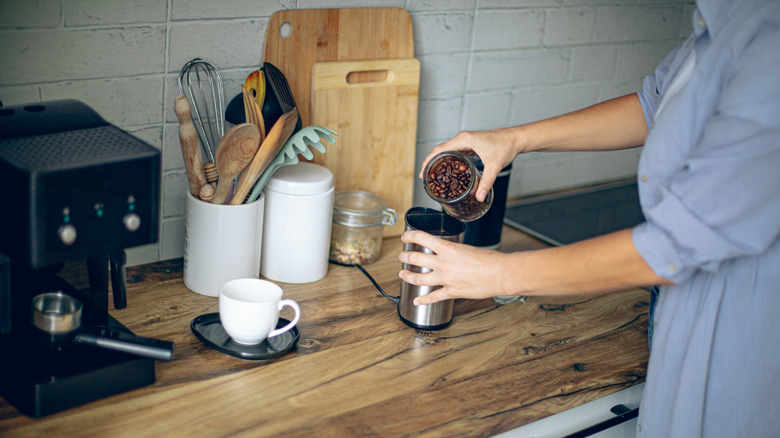Sometimes, between the hustle and bustle of morning routines, time can get away from us, leaving that once glorious, steaming mug of delicious hot coffee a chilled cup of bitter bean juice. It’s just like Cinderella’s pumpkin carriage after midnight, but in this case after about 20 minutes. It’s not you, though; it’s the coffee. Scientifically, there’s a major property of coffee, lactones, that worsen the bitterness in your brew as it cools. Even fast-food joints serving up high-quality cups of joe aren’t immune to the lactone problem.
Coffee roasting expert and managing editor at Coffee Roast, Theo Chan, explained the double-edged sword that lactones provide in a shot of espresso or cup of coffee to Food Republic. “Lactones are a class of organic compounds found in coffee, particularly in the oils of dark roasted beans,” he explained. “They are responsible for creamy, sweet, and slightly fruity flavors in freshly brewed coffee. These compounds are highly volatile and degrade as the coffee cools, converting into carboxylic acids, contributing to increased acidity and bitterness over time.”
Volatile magic bean juice, for sure. Since the degradation of lactones increases the bitterness, sweeter coffees like Italy’s famous bicerin (a mix of coffee, chocolate, and cream) or other sweetened lattes could mitigate the added acidity as it cools. There’s no reversing the lactone effects, though; once the chemical process begins, you can’t undo it.
How to prevent the lactones from ruining your brew
Aside from sweetening your coffee, expert Theo Chan hasn’t found a practical way to prevent lactones from their swift breakdown. Although, he did have some advice: “First off, buy freshly roasted, whole bean coffee, and brew between one and three weeks after the roast. … If you are [wanting] to do things like freeze or cool coffee, the sooner and faster you do it, the better.”
Temperature isn’t really the main factor in lactones; it’s actually time. If you want an iced coffee at home and don’t want to spend 18 to 24 hours making cold brew, then immediately popping your fresh coffee in the fridge or freezer should help save you from the lactone breakdown since it’ll cool more quickly.
Another potential way to lessen lactones is looking at switching up your roast. You should still opt for buying whole beans and grinding them per brew at home, but the differences in light versus dark coffee roasts could help as well. As Chan mentioned, the lactones come from the oils in dark roasts. Choosing a lighter roast with less of these oils will allow for fewer lactones in your coffee as a whole. This truth and science behind why your coffee tastes extra bitter after a while also puts the myth about ruining your coffee with the microwave to bed.






